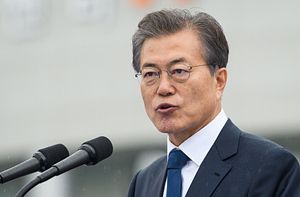Young South Koreans are protesting President Moon Jae-in’s attempt to form a unified ice hockey team with North Korea for the Winter Olympic Games in his bid to ease the crisis with Pyongyang. As a university professor, I am close to many students, and know what they feel. They are right.
It is quite wrong that South Korean athletes who have been training for years should suddenly lose their places in the national team in an ill-planned gesture to appease North Korean leader Kim Jong-un. The athletes should not have to sacrifice their sports careers for a romantic, nationalist notion that the two Koreas are, at some level, the same country.
This sentiment and its implications go far beyond the Games. The crisis over the North’s nuclear weapons program is too serious, and the differences between the two Koreas too great for such a romantic and nationalist approach to Korean identity. Any solution to the crisis – and any potential reunification of North and South – must recognize the deep differences between an economically successful democracy in the South and an impoverished, nuclear-armed totalitarian North.
Moon’s policy is based on an anachronistic idea of romantic nationalism that puts an emphasis on ethnic factors such as blood, language, and culture. This approach is popular among older South Koreans who value such emotional ties. According to research by the Korean Institute for National Unification (KINU) in July 2017, fully 47.3 percent of those 60 and over believe the two Koreas can be reunified into a single nation-state. They seem to believe in a romantic nationalism that makes them forget the fact that North and South Korea have vastly different political systems. It even allows such people to set aside the fact that the North is an existential threat to the South.
Only 20.5 percent of young South Koreans in their 20s agree. Many of them see Kim Jong-un as a dictator with a silver spoon in his mouth who just happened to inherit a country from his grandfather and father. They criticize the fact that he threatens not only South Korea but the entire world.
As in many countries, older voters have more sway, however. The illusion and myth of romantic nationalism is so entrenched among older South Koreans that North Korea capitalizes on this mood to advance its propaganda of “national cooperation.” In his New Year’s address, Kim propagated the idea by calling the PyeongChang Winter Olympics a “big national event.”
Worse, Kim has demanded that conflicts between North and South – including the nuclear weapons issue – should be solved through national cooperation and not international cooperation. In other words, by excluding the United States, South Korea’s strongest ally.
As well as acquiescing to North Korean demands to form a unified Olympic team, the Moon administration has caved in to pressure on crucial security issues. It shies away from the U.S.-ROK alliance, the bedrock of peace and prosperity on the Korean Peninsula as well as in the region. It has weakened security cooperation with the United States and Japan and delayed regular U.S.-South Korean military drills.
Instead, it leans toward China, North Korea’s strongest remaining backer. The president has kowtowed to Chinese demands that the South should not pursue deepening security cooperation with the United States and Japan. Seoul has promised not to introduce further THAAD air defense systems or join the U.S.-led missile defense system, even though this is vital in detecting North Korean missile movements.
The colonial experience, mainly under Japanese rule, helped Koreans forge their national myth in terms of resistance to foreign powers. South Korea went beyond this resistance-type of nationalism to develop civic nationalism with the foundation of the Republic of Korea in 1948. The Korean ethnic nation was reborn in the South as a civic nation with individual liberty, equality, and political rights.
Yet South Koreans, especially older people, are still susceptible to the idea of romantic nationalism because of the colonial legacy and North Korean propaganda. Koreans in the North have not experienced civic nationalism since defeat of Japan and liberation in 1945. North Korea was turned into a revolutionary totalitarian state supported by ideology that derives its justification from romantic nationalism.
Henry Kissinger argues that diplomatic negotiation is not the pursuit of “complete satisfaction” but “balanced dissatisfaction” between two countries. This flexibility is lost in Moon’s populist diplomatic drive as well as in the romantic, nationalistic approach. It makes it harder to deal coherently and realistically with Pyongyang.
In the face of North Korean nuclear and missile threats, South Korea must pursue an approach based on close cooperation with the United States and Japan, which share the same liberal political and economic values. Anything else is mistaken and, in the current crisis, very dangerous.
The reunification of Korea, if it ever comes, must be based on the creation of a common political and economic system and not just on ethnicity. A reunified state must on no account possess nuclear weapons. This realistic new approach must begin with South Koreans seeing North Korea not as part of the same ethnic entity, but as a totalitarian state with nuclear weapons.
Kim Young Ho, a professor at Sungshin University in Seoul, is a former Blue House unification advisor and ambassador on North Korea human rights. This piece originally appeared as part of Pacific Forum CSIS’s PacNet series here, and is republished with kind permission.

































